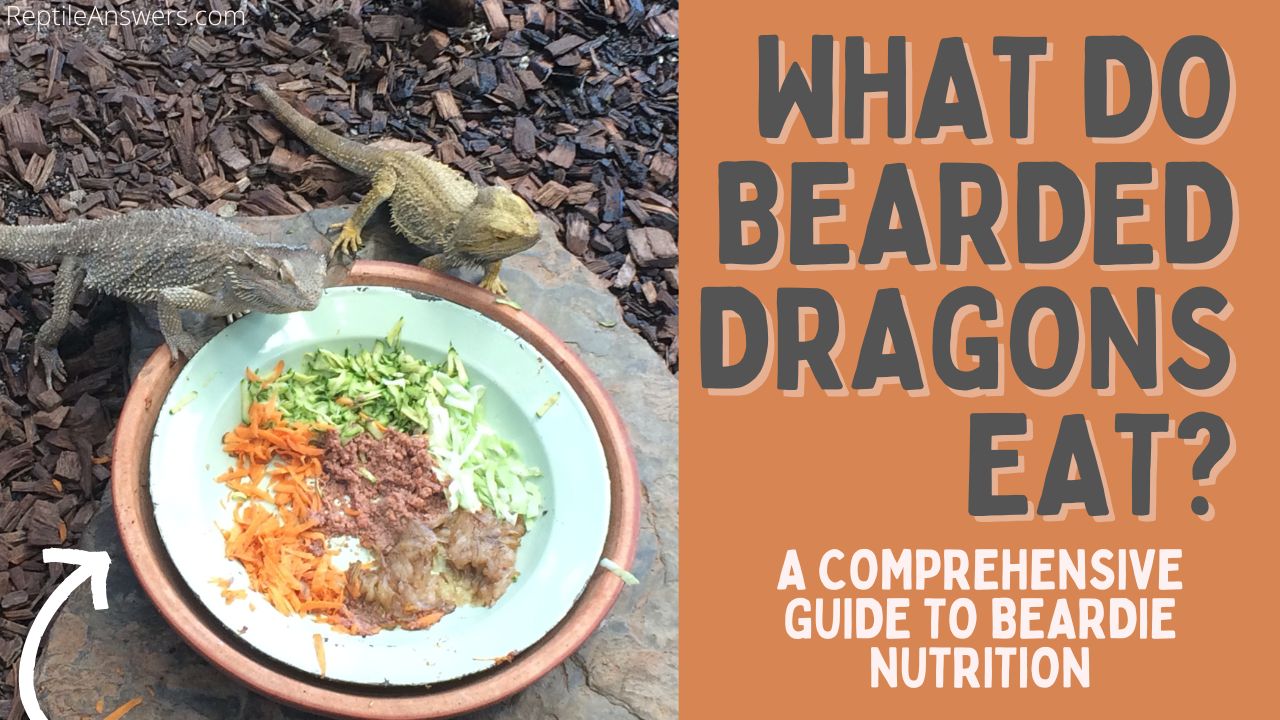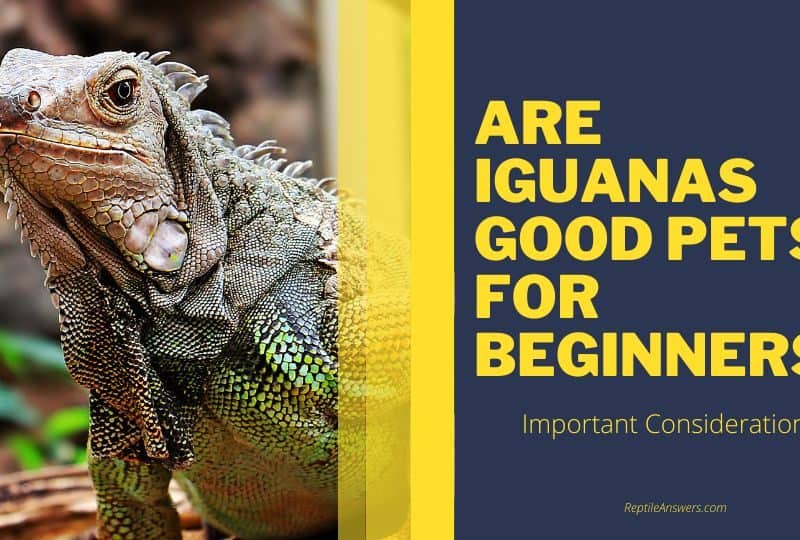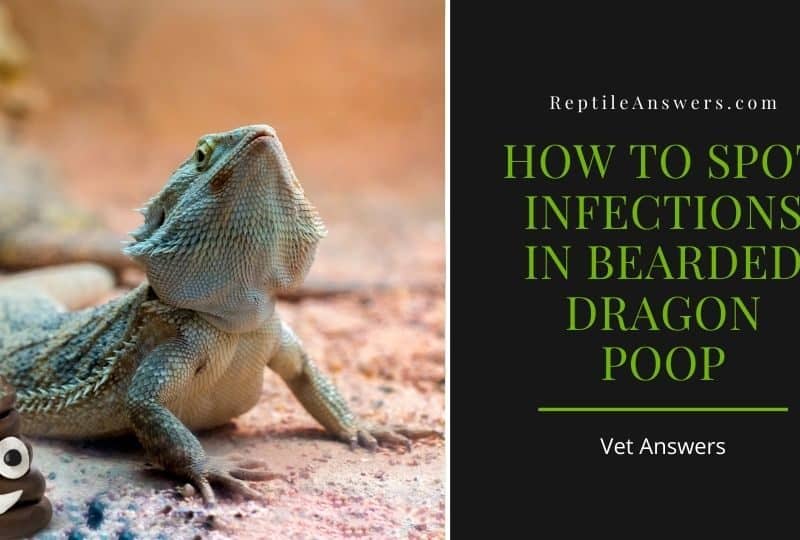Bearded dragons are a popular pet, and for a good reason – they are cute, friendly, and relatively easy to care for. But one of the most common questions people have about bearded dragons is what do bearded dragons eat? In this comprehensive guide to beardie nutrition, we will answer that question and provide you with all the information you need to make sure your bearded dragon is getting the right food.

What do bearded dragons eat?
Bearded dragons are native to Australia, and their diet reflects that. In the wild, they mostly eat insects, although they will also eat greens and fruits. In captivity, they can be fed a variety of different foods, including chopped vegetables, insects, and commercially-prepared diets. It is important to provide a balanced diet to ensure proper growth and development. Let’s now talk about the foods bearded dragons eat!

Vegetables
If you are thinking of getting a bearded dragon or already have one, you may be wondering what kind of vegetables they can eat. Here is a list of some common vegetables that are safe for bearded dragons:
1. Spinach
Beardies love spinach because it is packed with vitamins and minerals. Popeye wasn’t wrong- spinach is an excellent source of iron, calcium, and Vitamins A and K. It’s also a good source of fiber, which can help with digestion. Spinach is low in calories and fat, making it a great food for beardies who are trying to maintain a healthy weight. As an added bonus, the green leaves can help to make your beardie’s cage look more festive!
2. Carrots
Carrots are a popular vegetable for bearded dragons. They are a good source of Vitamin A and beta-carotene, which can help to keep your beardie’s skin and eyes healthy. Carrots are also a good size for most beardies, making them easy to eat. Some people choose to feed their beardies baby carrots, while others chop the carrots into small pieces. Whichever way you choose to feed them to your beardie, carrots can be a nutritious and delicious treat.
3. Broccoli
Broccoli is not only nutritious, but it is also a good source of fiber. Bearded dragons need a high-fiber diet to help them maintain a healthy digestive system. In addition, broccoli is rich in vitamins A, C, and K. These vitamins are essential for bearded dragons as they help to support the immune system and promote healthy growth. Broccoli is also a low-calorie food, making it an ideal choice for bearded dragons that are trying to lose weight.
4. Celery
Celery is a good source of vitamins and minerals and helps to promote a healthy digestive system. Bearded dragons typically like to eat the leaves and stalks of celery, but the shoots and flowers can also be offered as a treat. When feeding celery to a bearded dragon, it is important to wash the vegetable thoroughly and cut it into small pieces to prevent choking.
5. Cabbage
Cabbage is a common vegetable given to bearded dragons. It is rich in vitamins and minerals, and its crunchy texture can help keep your dragon’s teeth clean. When feeding cabbage to your dragon, make sure to chop it into small pieces and offer it alongside their regular diet.
6. Kale
Kale has vitamins A and C, as well as calcium and iron. It is also a good source of fiber, which helps bearded dragons maintain a healthy digestive system. When feeding kale to a bearded dragon, it is important to chop it into small pieces so that the dragon can easily eat it. kale can be fed to a bearded dragon raw or cooked; however, many dragons prefer eating it raw.
7. Lettuce
There are many different types of lettuce that bearded dragons can eat, including romaine, iceberg, and even red leaf lettuce. While lettuce is not as nutritionally dense as other vegetables, it is a good source of hydration for beardies. In addition, lettuces provide bearded dragons with a crunchy texture that they enjoy.
8. Cilantro
Cilantro is packed with nutrients and has a refreshing flavor that many reptiles find appealing. When feeding cilantro to your bearded dragon, be sure to wash it thoroughly and chop it into small pieces to avoid choking.
9. Beet greens
Beet greens are a popular food for bearded dragons. They are packed with nutrients and offer a variety of health benefits. Beet greens are an excellent source of vitamins A, C, and K. They also contain magnesium, potassium, iron, and fiber. Beet greens can help improve digestion and prevent constipation. Finally, beet greens are low in calories and fat, making them an ideal food for bearded dragons who are trying to lose weight or maintain a healthy weight.
10. Mustard greens
Mustard greens are packed with nutrients and provide a crunchy texture that many dragons enjoy. Bearded dragons typically eat mustard greens raw, but they can also be steamed or boiled. When feeding mustard greens to your beardie, be sure to remove the stems and chop the leaves into small pieces. This will help your dragon to digest the greens properly and prevent them from getting sick.
11. Collard greens
Collard greens are an excellent source of nutrition for bearded dragons. They are a good source of fiber and contain vitamins A, C, and K. In addition, collard greens are a low-calorie food, which is important for reptiles that are prone to obesity. When feeding collard greens to a bearded dragon, it is important to chop them into small pieces and cook them lightly to prevent indigestion.
12. Parsley
Bearded dragons love parsley! This dark leafy green is packed with nutrients and has high water content, making it a great choice for hydration. Plus, the fact that it’s low in oxalates means it’s less likely to cause digestive issues. Parsley is also a good source of calcium, which is essential for bearded dragons’ bone health.
13. Bell peppers
Bell peppers are a favorite vegetable of bearded dragons. They love the crunchy texture and the sweetness of the flesh. Bell peppers are also good for bearded dragons because they are a good source of fiber and vitamins A, B6, and C.
14. Cucumbers
Beardies love cucumbers because they are refreshing and hydrating. Cucumbers are also a good source of vitamin C, which is essential for a healthy immune system. Eating cucumbers can help beardies stay healthy and avoid respiratory infections.
15. Kohlrabi
Beardies love kohlrabi because it is crunchy and has a slightly sweet taste. This vegetable is a good source of vitamins C and B6, as well as potassium and fiber. Eating kohlrabi can help beardies to stay healthy and active.

Fruits
Beardies can also eat the following fruits:
1. Grapes
Bearded dragons love grapes! They are sweet and juicy, and they provide a good source of vitamins A and C, as well as dietary fiber. They are also a good source of water, which is essential for beardies. In addition, grapes contain antioxidants that can help to protect the bearded dragon’s skin.
2. Bananas
Bananas are a popular food choice for bearded dragons. They are packed with nutrients that are essential for a beardie’s health. Bananas are also a good source of fiber, which helps with digestion. And they are a natural way of sweetness, which can be a nice change of pace for your bearded dragon’s diet.
3. Strawberries
Bearded dragons absolutely love strawberries! Not only do they taste great, but they are also packed with nutrients that are essential for bearded dragons. Strawberries are a good source of vitamin C, potassium, and fiber, all of which are important for maintaining a healthy digestive system.
4. Apples
Apples contain vitamins A and C, as well as fiber. They also have a high water content, which is beneficial for bearded dragons. Furthermore, apples help to improve digestion, and they also provide essential nutrients that help keep beardies healthy and active.
5. Tomatoes
Beardies love tomatoes because they are sweet and juicy. They are a great source of vitamins A and C, and they contain lycopene, which is an important antioxidant. Tomatoes are also a good source of fiber, which helps keep beardies healthy and regular.
6. Blueberries
Bearded dragons love blueberries because they are sweet and nutritious. Blueberries are a good source of vitamins A and C, as well as fiber. They are also low in calories, making them a healthy treat for bearded dragons. Blueberries are high in antioxidants, which can help to boost the immune system and protect against disease. In addition, the small size of blueberries makes them easy for bearded dragons to eat.
7. Watermelon
Beardies love watermelon for its sweetness and juiciness. Watermelon is packed with nutrients like vitamins A, B, and C, as well as minerals like potassium and magnesium. It’s also a good source of fiber. All of these nutrients are essential for beardies and help to keep them healthy and active. Watermelon is also a low-calorie treat, making it a great choice for beardies who are trying to maintain a healthy weight.
8. Raspberries
Raspberries are a popular food for bearded dragons. They love the sweet taste and the soft texture. Raspberries are also a good source of vitamins A and C. They help to keep beardies healthy and improve their immune system. In addition, raspberries are a good source of fiber, which helps to keep beardies regular.
9. Blackberries
Blackberries are nutritious and provide many health benefits for beardies. Some of the nutrients that blackberries contain include vitamins A, C, and E. Blackberries are also a good source of fiber. This fruit helps bearded dragons to stay healthy and provides them with the nutrients they need to grow and thrive.
10. Oranges
Bearded dragons enjoy eating oranges because of their sweetness. The nutritional value of orange also helps beardies stay healthy. Oranges are a good source of Vitamin C, which is important for a dragon’s immune system. They are also a good source of fiber, which helps with digestion.
11. Pineapple
Pineapple is a popular fruit among bearded dragons. They love the sweet taste and the juicy flesh. Pineapple is also a good source of Vitamin C, which helps to keep their skin healthy and their immune system strong. Pineapple is also a good source of fiber, which helps to keep bearded dragons active.
12. Papaya
Bearded dragons love papayas because of their sweet taste. This fruit is also a good source of vitamins A and C, as well as fiber. Papayas are especially good for bearded dragons because they contain a compound called papain, which aids in digestion.
13. Peaches
Bearded dragons love eating peaches. They are a great source of nutrition for beardies. They are packed with several vitamins, minerals, and antioxidants. Peaches are also a good source of fiber which helps to keep their digestive system healthy and functioning properly.
14. Apricots
Apricots are a good source of vitamins A and C, as well as fiber and potassium. They are also low in calories and fat, making them a healthy snack for beardies. Eating apricots can help beardies maintain a healthy weight, improve their skin and coat health, and boost their immune system.
15. Figs
Figs are nutritionally dense, and they provide a good source of vitamins and minerals. Figs are also high in fiber, which helps to keep bearded dragons healthy. Additionally, the sweetness of figs can be appealing to bearded dragons.

Bugs & insects
Here are some of the best bugs and insects to feed your bearded dragon:
1. Earthworms
Earthworms are a favorite food of many bearded dragons. They are high in protein and low in fat, making them an ideal food for these reptiles.
2. Cockroaches
Cockroaches are another type of insect that bearded dragons love to eat. They are a good source of protein and other nutrients.
3. Silkworms
Silkworms are a type of caterpillar that is often used as reptile food. They are high in protein and calcium, making them an excellent food for bearded dragons.
4. Crickets
Crickets are one of the most commonly fed insects to reptiles. They are a good source of protein and other nutrients.
5. Hornworms
Like other insects listed, you can feed hornworms to your beardie as another easy choice for protein and calcium.
All of these bugs and insects make great food for bearded dragons. Offer them a variety of items to keep them interested and ensure they are getting the nutrition they need.

The importance of a balanced diet
In the wild, bearded dragons typically eat a diet of insects, small mammals, and plants. However, bearded pet dragons require a more balanced diet to stay healthy. In captivity, these lizards should be fed a mix of live insects, vegetables, fruits, honey, and commercial bearded dragon food pellets. A well-rounded diet is important for bearded dragons because it helps them to stay active and maintain their metabolism. In addition, a diet that is too high in protein can lead to health problems such as liver disease.
Vegetables should make up about 30% of their diet, while insects should be about 20%. The remaining 50% can be a mix of fruits and commercial food. It’s important to make sure that their food is properly dosed with vitamins and minerals, as bearded dragons are susceptible to nutritional problems. By providing your pet with a balanced diet, you can help them to stay healthy and happy for years to come.
Sample diets for different life stages of a beardie
Depending on their stage in life, bearded dragons have different dietary needs. For example, baby dragons up to 4 months old should be fed insect protein 2-3 times per day. As they grow older and approach 5-6 months, they can be transitioned to a diet of 70% insects and 30% vegetables. Sub-adult dragons at the age of 12-18 months should be fed 30% insects and 70% vegetables.
Adult dragons over the age of 18 months can then be fed a diet of 80% vegetables and 20% insects. It is important to note that all dragons should have access to calcium powder, which can be sprinkled on their food. A diet rich in calcium is essential for maintaining healthy bones and joints. By following these guidelines, you can ensure that your bearded dragon stays healthy and happy at every stage of life.
Supplements for bearded dragons
Bearded dragons often eat a diet of commercial foods that may be lacking in certain nutrients. As a result, many pet owners choose to give their bearded dragons supplements to ensure that they are getting all the nutrients they need. The most important nutrients for bearded dragons are calcium and vitamin D.
Good sources of calcium include dark leafy greens and calcium-rich vegetables such as kale and collards. Vitamin D can be found in fortified foods, such as some brands of commercial dragon food, or it can be provided via exposure to natural sunlight or artificial UVB light.
In addition, many pet owners give their bearded dragons a good multivitamin supplement to help fill any nutrient gaps in their diet. By providing these essential nutrients, supplements can help keep your bearded dragon healthy and thriving.

What to do if your beardie is not eating enough
If your beardie isn’t eating enough, there are a few things you can do to encourage them to eat.
- First, make sure that they have a varied and nutritious diet. If they are only eating one type of food, they may become bored and lose interest in eating.
- Second, try offering them different types of food, both live and vegetables. Some beardies are picky eaters, but others will happily eat whatever is offered to them. Third, make sure that their food is properly prepared. If it is too hard or too soft, they may not be able to eat it.
- Finally, don’t hesitate to ask your veterinarian for help. They can offer more specific advice on how to get your beardie to eat more.
Final words
Bearded dragons are a type of lizard that originates from Australia. They are popular pets because they are relatively easy to care for and have a docile nature. When it comes to their diet, bearded dragons should eat a mix of live insects, vegetables, fruits, and commercial food pellets.
A well-rounded diet is important for bearded dragons because it helps them to stay healthy and avoid nutritional problems. By following these guidelines, you can ensure that your bearded dragon gets all the nutrients they need to thrive.



